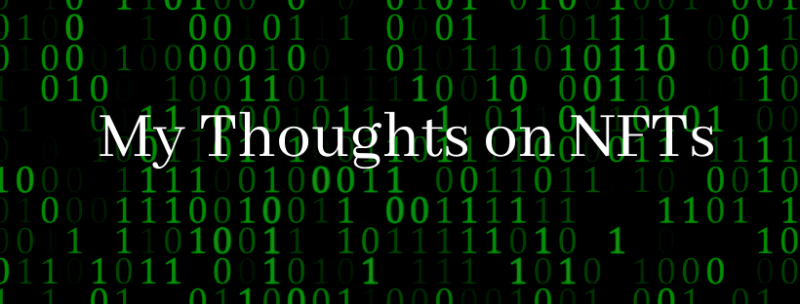
NFTs, or nonfungible tokens, have appeared throughout the news cycle recently. NFTs use blockchain technology similar to Bitcoin to make a certificate of authenticity for a digital item or to make what amounts to a digital trading card. A certificate of authenticity NFT basically states you own an original or serial-numbered copy of a digital item. This proves that copy unique from all other copies, and this is where I speculate a shift in how we could consume digital media.
Let’s consider a book publisher. A book publisher could issue NFTs for a certain number of eBooks. If you own this eBook an NFT will show you own it. Now imagine software would require proof of ownership before you can access that eBook, a sort of digital rights management tied to NFTs. Because an NFT is a blockchain, this sort of DRM could not be circumvented, especially if the blockchain must be decrypted before the eBook can be access. Of course, decrypting a blockchain on-the-fly isn’t possible right now. It takes powerful processors a lot of electricity and time to decrypt a blockchain. However, as hardware gets faster, eventually this sort of on-the-fly decryption may be possible. If your identifier (which is also an NFT) isn’t found in the eBook blockchain, the publisher will know you pirated it and the file will refuse to open or delete itself.
This hypothetical scenario could be applied to all media: videos and even anime and manga. If I am understanding NFTs right, they could provide the final word on piracy. Of course, there would be measures around that. Nothing would stop an NFT holder from doing a stream capture of a video and then distributing that copy. Likewise, people can screenshot each page of a manga for a scanlation. However, this blockchain-based anti-piracy method would make it significantly harder for people to copy and consume media than current DRM technology. If the file itself is encrypted with the NFT as its encryption key, opening the file would be impossible unless you had the blockchain token. And such a token, by its nature, could not be publicly distributed because it records ownership every time it is transferred.
As an author I am mixed about this possibility, just as I am mixed about piracy. Kanzashi and some of my other books have been pirated. On one hand, I feel flattered that someone liked my work enough to pirate it. On the other hand, I don’t make a lot of money as a writer. Every pirated copy chips at my meager income. But piracy does offer more access and a chance to gain readers, so it is definitely a mixed bag. NFT controlled books may increase the value of eBooks, making them closer to their physical counterparts in that NFT-locked eBooks can’t be duplicated endlessly.
The NFT and the Waifu

Of course, all of this is merely me musing on a new technology. We can’t know exactly how NFTs will change our digital landscape, or even if they will at all. However, companies look for ways to stop piracy, and NFTs may provide the means. We may see the trading-card aspect of NFTs take off more than its authenticity side. Digital trading cards, for lack of a better phrase, could work well for people into waifus. You could NFT your waifu, which doesn’t give you legal ownership of the copyright, but it does show a claim. It is akin to owning a baseball card. You own that particular card, but you don’t own the player or the any of the other rights associated with that baseball card. But those cards still sell for large sums if they are rare. So, hypothetically, you could buy an NFT for, say, Zero Two from Darling in the Franxx, and so be the only true “spouse” of her. It would be identical to owning a one-of-a-kind Mickey Mantle or Michael Jordan trading card. Other versions exist, but you have the rarest. The idea could apply to many things: eBooks, video clips, digital art, video game characters, and even YouTube creators.
NFT trading cards in this regard are open-ended. Owning Zero Two’s NFT wouldn’t give you any legal options (right now). Instead, it acts as proof that she is your and only your waifu. I’m uncertain how this would effect the waifu community. I can see the most dedicated paying large sums for proof of their love for a certain character. Of course, then we will see any waifu wars that erupt post-NFT getting especially ugly as NFT holders claim their rights on forums and social media. Could lawsuits happen? Possibly. All of this seems silly for those of us who are not into waifu or NBA digital trading cards. However, other digital assets have proven to be valuable. Well-known domain names, for example, sell for large sums. Domain names are akin to buying digital land. It is possible NFTs will become similar in worth as more markets for them develop. It is too soon to say if NFTs will take off or not. Bitcoin and other cryptocurrency may be outlawed in some countries, such as India, as I write this. This could equally outlaw NFTs and prevent them from developing further.
The digital-rights management aspect of NFTs may be where the tokens go, especially with video games and other software. In the coming years, it may change how you consume manga, anime, and other content. Or it may remain the domain of high-income speculators and hard-core fans of a niche collectible market. Right now, NFTs are gambling because the market is so new and speculative. Blockchain technology remains too computationally expensive (not to mention the electricity!) for everyday use. But if technology has taught me nothing else, in time what is hard to do now will become easy. When I started my animation degree back in 2001, a render with raytracing took a render-farm and a weekend to produce several frames. Now we have games that crunch the same raytracing at 120 frames every second. Blockchain decryption will eventually hit the same point if the demand requires it.



